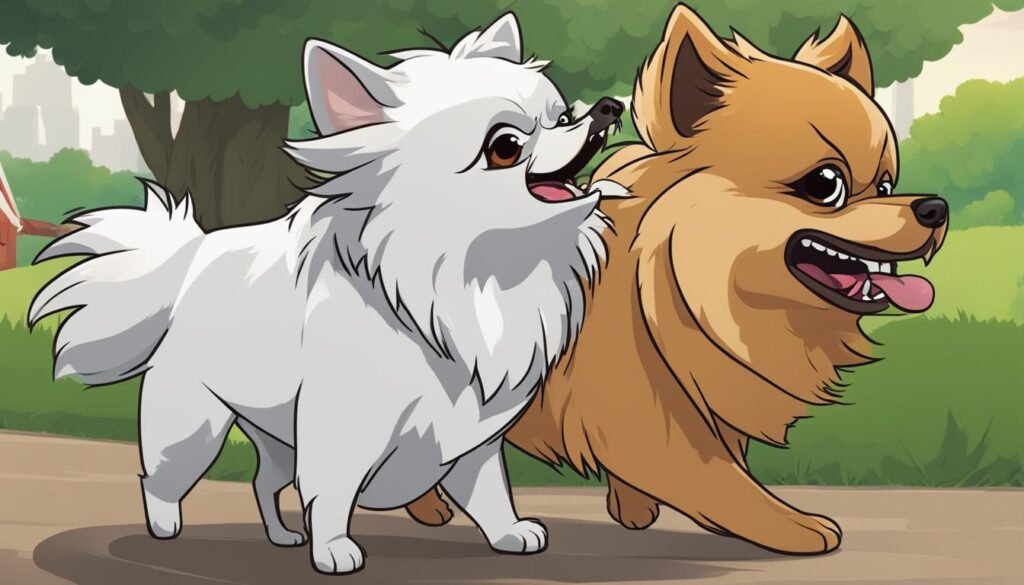Welcome to our article where we uncover the truth about owning a Pomeranian. While these fluffy creatures may appear adorable at first glance, they come with a unique set of challenges that may not make them suitable for everyone. In this section, we will delve into the various behavior problems, including aggression, that Pomeranians are known for. So, if you’ve ever wondered why Pomeranians may not be the best fit for your home, keep reading to find out more.
Key Takeaways:
- Pomeranians are sassy and manipulative due to their strong personalities.
- They may suffer from separation anxiety disorder, leading to destructive behavior.
- Pomeranians can be difficult to housebreak and often have dental issues.
- Excessive barking and high maintenance grooming are common traits in Pomeranians.
- They may exhibit behavioral issues and suspicion towards strangers.
Pomeranian Temperament: Understanding the Sassy Side
Pomeranians are known for their sassy personalities, which can be a double-edged sword for potential owners. While their spirited nature can be amusing and endearing, it can also present challenges. These pint-sized dogs love attention and have a knack for getting what they want. They can be manipulative and use their charm to bend you to their will.
Despite their stubborn streak, Pomeranians are relatively easy to train. They are smart and eager to please, but they require consistent and patient guidance. It’s important to establish yourself as the pack leader from the beginning to prevent any behavior issues later on. However, it’s crucial to understand and accept their quirks, as they may have their own ideas about what they should and shouldn’t do.

Pomeranians are also notorious for what’s commonly referred to as the Napoleon Complex. This term describes their tendency to compensate for their small size by displaying behaviors such as aggression, barking excessively, and being territorial. Early socialization and proper training can help mitigate these tendencies, but it’s important to be aware of them when considering a Pomeranian as a pet.
The Sassy Side of Pomeranians
Pomeranians love attention and can be manipulative. Due to irresponsible breeding practices, some Pomeranians may have unstable temperaments and behavioral issues. Understanding their temperament is crucial for potential owners to determine if they can handle these challenging traits.
Training a Pomeranian
While Pomeranians are relatively easy to train, they have their quirks that require acceptance. They are smart and eager to please, but they may have their own ideas about what they should and shouldn’t do.
The Napoleon Complex
Pomeranians often exhibit behaviors associated with the Napoleon Complex, such as aggression, barking excessively, and territoriality. Early socialization and proper training can help mitigate these tendencies.
Pomeranian Separation Anxiety: Dealing with the Clinginess
Pomeranians are known for their affectionate nature and their tendency to form strong bonds with their owners. While this can be endearing, it can also lead to separation anxiety when they are left alone.
“My Pomeranian, Bella, becomes anxious and agitated whenever I leave the house. She starts barking excessively and can even become destructive,” says pet owner Sarah Roberts.
Separation anxiety in Pomeranians can manifest in various ways, including excessive barking, whining, pacing, and destructive behavior. It is important to address this issue early on to ensure the well-being of your furry friend and maintain a harmonious living environment.
Understanding Separation Anxiety Disorder
Pomeranian separation anxiety disorder occurs when dogs become overly dependent on their owners and struggle to cope with being left alone. This condition can be distressing for both the dog and the owner, but there are strategies that can help manage and alleviate the symptoms.
- Early Socialization: Introduce your Pomeranian to different people, environments, and experiences from a young age. This helps them become more confident and adaptable, reducing the chances of separation anxiety developing.
- Gradual Separation Training: Start by leaving your Pomeranian alone for short periods and gradually increase the duration over time. This helps them learn that you will always return and builds their confidence in being alone.
- Seek Professional Help: If your Pomeranian’s separation anxiety does not improve with training and behavior modification techniques, it may be beneficial to consult a professional dog trainer or a veterinary behaviorist.
By addressing separation anxiety in Pomeranians, you can help your furry friend feel more secure and reduce their anxiety levels when you’re not around. Remember to be patient and consistent in your training efforts, and always provide your Pomeranian with plenty of mental stimulation and physical exercise to help them expend their energy.
Pomeranian Housebreaking Challenges: Patience is Key
Housebreaking a Pomeranian can be a challenging task due to their unique characteristics. These dogs have a small size and limited bladder capacity, which means they need frequent potty breaks. It’s crucial to establish a consistent routine and provide plenty of opportunities for them to relieve themselves outside.
Pomeranians are intelligent and can be trained to use a designated spot for bathroom needs. Crate training can be particularly helpful in teaching them to hold their bladder and understand where they should eliminate. By creating a positive association with the crate and using positive reinforcement techniques, such as treats and praise, you can encourage your Pomeranian to cooperate during the housebreaking process.
Consistency and patience are key when housebreaking a Pomeranian. It’s important to watch for signs that they need to go outside, such as sniffing or circling, and immediately take them to their designated spot. Accidents may happen during the training period, but it’s essential not to punish or scold your Pomeranian, as this can create fear and hinder the progress. Instead, focus on reinforcing positive behaviors and offering rewards when they successfully eliminate in the appropriate spot.
Remember, housebreaking a Pomeranian requires time and dedication. It’s a process that requires patience and understanding. By providing consistent training, establishing a routine, and remaining positive throughout the training journey, you can overcome the housebreaking challenges and set your Pomeranian up for success.
Pomeranian Health Issues: Teeth and Beyond
Pomeranians are adorable little dogs, but like all breeds, they have their fair share of health issues. One of the most common problems among Pomeranians is dental issues. Due to their small jaws and overcrowding, Pomeranians are prone to tooth decay, swollen gums, and even tooth loss. Regular dental care is essential to prevent these problems and maintain your Pomeranian’s oral health.
Grooming is another area where Pomeranians require special attention. With their double coat, Pomeranians are known for shedding heavily and easily developing mats. Regular grooming sessions, including brushing and trimming, are necessary to keep their coat healthy and prevent tangles. It’s important to invest time and effort in maintaining your Pomeranian’s coat to keep them comfortable and looking their best.
“Regular dental care is essential to prevent tooth decay, swollen gums, and even tooth loss.”
In addition to dental and grooming challenges, Pomeranians can also be prone to other health issues such as luxating patella, collapsed trachea, and heart problems. It’s important to stay vigilant and take your Pomeranian for regular check-ups with a veterinarian to catch any potential health issues early.
Signs of Dental Problems in Pomeranians:
- Bad breath
- Difficulty eating or chewing
- Bleeding or swollen gums
- Loose or missing teeth
Tips for Maintaining Your Pomeranian’s Coat:
- Brush your Pomeranian’s coat at least three times a week, using a slicker brush or a comb with wide teeth.
- Trim your Pomeranian’s nails regularly to prevent them from becoming too long and causing discomfort.
- Bathe your Pomeranian once a month or as needed, using a gentle dog shampoo.
- Use a detangling spray or conditioner to make brushing easier and prevent matting.
By being aware of these health and grooming challenges, you can ensure that your Pomeranian leads a happy and healthy life. With proper care and attention, you can provide the best possible quality of life for your furry companion.
Addressing Behavioral Issues in Pomeranians: From Possessiveness to Suspicion

Pomeranians, despite their charming appearance, can sometimes exhibit behavioral issues that need to be addressed by their owners. Two common concerns are possessiveness and suspicion. Possessiveness in Pomeranians can manifest in guarding behavior over food, toys, or other belongings, often accompanied by growling or aggressive displays. This behavior can be disruptive and potentially dangerous, especially in households with children or other pets. It is essential for owners to tackle possessiveness early on through consistent training and setting clear boundaries to promote a harmonious living environment.
“Possessiveness in Pomeranians can be challenging to deal with,” says dog behavior expert Dr. Jane Richards. “It’s important to establish yourself as the pack leader and teach your Pomeranian that resources are shared and not to be guarded. Reward-based training methods and positive reinforcement can help address possessiveness.”
Another behavioral issue that Pomeranian owners may encounter is suspicion towards strangers. Pomeranians, being naturally protective and alert, can display aloofness and suspicion when meeting new people. This behavior may lead to excessive barking and even aggressive responses if not properly addressed. Early and consistent socialization is key to teaching Pomeranians how to interact appropriately with strangers and distinguishing between potential threats and harmless individuals. Obedience training can also play a significant role in helping Pomeranians develop confidence and trust in their owners’ guidance.
In conclusion, dealing with possessiveness and suspicion in Pomeranians requires patience, consistent training, and a firm but loving approach. Understanding their unique personality traits and working with their instincts can help address and manage these behavioral issues effectively. By taking proactive steps to tackle these challenges, Pomeranian owners can ensure a happy and well-adjusted companion for many years to come.
Conclusion
Despite the challenges associated with owning a Pomeranian, these dogs have positive traits that can make them a suitable choice for some individuals. Pomeranians are known for their trainability and adaptability to apartment living, which can be appealing to potential owners.
However, it is crucial to consider the temperament concerns, grooming challenges, and health issues that come with owning a Pomeranian. Their sassy personalities and potential behavioral issues require proper training and socialization to ensure a harmonious relationship.
In addition, Pomeranians have high maintenance grooming needs, especially when it comes to their coat. Regular brushing and trimming are necessary to keep their coat healthy and prevent mats and shedding. Dental care is also essential to prevent dental issues that are common in Pomeranians.
Overall, while Pomeranians may not be the ideal choice for everyone, they can be a rewarding pet for those who are willing to provide the necessary care and attention. By understanding their challenges and addressing them appropriately, potential owners can enjoy a fulfilling and loving relationship with their Pomeranian.
FAQ
Are Pomeranians suitable for everyone?
Pomeranians come with a set of challenges that make them unsuitable for some people. It is important to consider their behavior and health issues before deciding to bring one into your home.
What are some common behavior problems in Pomeranians?
Pomeranians can be sassy, manipulative, and exhibit behaviors associated with the Napoleon Complex, including aggression and disobedience.
Do Pomeranians suffer from separation anxiety?
Yes, Pomeranians can develop separation anxiety disorder, leading to destructive behavior and excessive barking when left alone.
Are Pomeranians difficult to housebreak?
Housebreaking a Pomeranian can be challenging due to their small size and frequent potty needs. Consistency and patience are key in the training process.
What are some health and grooming challenges in Pomeranians?
Pomeranians are prone to dental issues and require regular dental care. They also have high maintenance grooming needs due to their double coat.
Do Pomeranians exhibit possessiveness and suspicion?
Yes, Pomeranians can be possessive and suspicious towards food, toys, and strangers. Proper training and socialization are necessary to address these behaviors.

